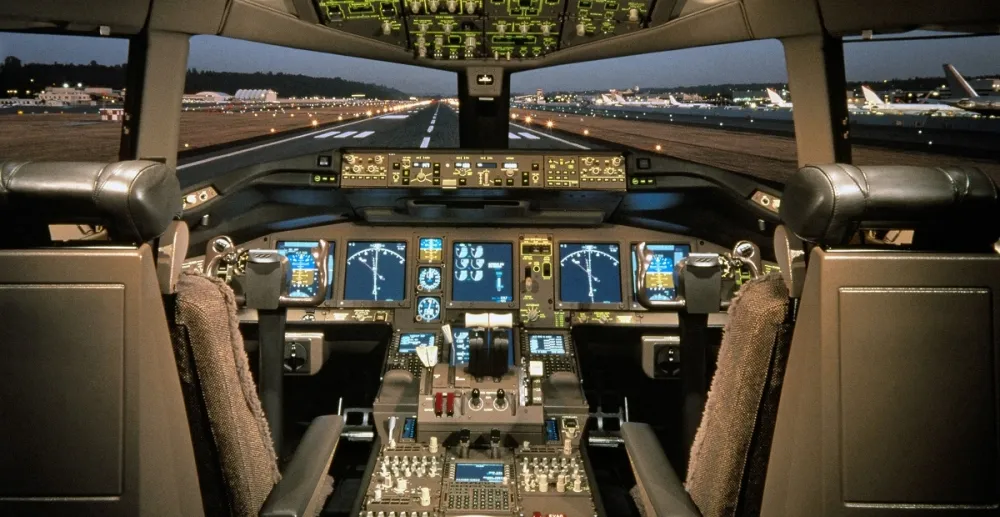
Boeing says pilotless planes to be tested
Jun 10, 2017

Boeing has announced plans to begin testing pilotless aircraft, marking a significant step towards the future of aviation. The company aims to develop technology that allows planes to operate autonomously, enhancing safety and efficiency while reducing operational costs. These tests are part of a broader trend in the industry, as advancements in artificial intelligence and automation pave the way for a new era in air travel. Boeing's initiative reflects a growing interest in unmanned flight systems, which could transform commercial aviation by addressing pilot shortages and improving flight reliability. The tests are expected to commence in the near future.
The Future of Aviation: Boeing's Pilotless Planes
Boeing has recently announced its plans to test "pilotless planes", marking a significant milestone in the aviation industry. This development is set to revolutionize air travel, offering enhanced safety, efficiency, and cost-effectiveness. The company aims to leverage advanced technologies, including artificial intelligence (AI) and machine learning, to create autonomous flight systems that can operate without human intervention.
Why Pilotless Planes?
The push for "pilotless aircraft" is driven by several factors. First and foremost is the demand for improved safety. According to statistics, human error is a leading cause of aviation accidents. By utilizing autonomous systems, Boeing hopes to reduce the risk associated with human oversight. Additionally, "autonomous flight technology" has the potential to streamline operations, reduce operational costs, and enhance the overall efficiency of air travel.
Key Features of Boeing's Autonomous Aircraft
Boeing's pilotless planes are designed with several innovative features that set them apart from traditional aircraft:
| Feature | Description |
|---|---|
| Advanced AI Systems | Utilizes machine learning algorithms to analyze flight data and make real-time decisions. |
| Enhanced Safety Protocols | Built-in redundancies and fail-safes to ensure passenger safety during flight. |
| Cost Efficiency | Reduces operational costs by minimizing the need for onboard crew and optimizing fuel usage. |
| Remote Monitoring | Allows ground control teams to monitor and manage flights remotely, ensuring constant oversight. |
Testing Phase and Timeline
Boeing plans to initiate the testing phase for its "pilotless aircraft" within the next few years. The testing will involve a series of simulations and real-world trials to assess the performance and safety of the autonomous systems. Initial tests will focus on short-range flights, gradually progressing to longer journeys as the technology proves itself. Boeing aims to obtain regulatory approval and launch commercial operations by the end of the decade.
Challenges to Overcome
While the concept of "pilotless planes" is promising, several challenges remain. Regulatory hurdles are among the most significant obstacles, as aviation authorities must establish guidelines and safety standards for autonomous flight. Additionally, public perception of flying in a "pilotless aircraft" poses a challenge that Boeing must address. Building trust and confidence in the technology will be crucial for widespread acceptance among passengers.
The Role of AI in Pilotless Aviation
Artificial intelligence plays a critical role in the development of "autonomous flight systems". By processing vast amounts of data from various sources, AI algorithms can make informed decisions during flight, such as adjusting altitudes, rerouting in response to weather conditions, and even handling emergencies. This level of decision-making capability is essential for ensuring the safety and efficiency of "pilotless planes".
Environmental Impact and Sustainability
Another significant advantage of "pilotless aircraft" is their potential for reduced environmental impact. With optimized flight paths and fuel consumption, autonomous planes can help lower carbon emissions associated with air travel. Boeing is committed to sustainability and aims to contribute to a greener future through the development of "pilotless aviation" technology.
Industry Responses and Future Implications
The aviation industry has shown a keen interest in the potential of "pilotless planes". Airlines and manufacturers are exploring partnerships and investments in autonomous technology. As more companies invest in this area, we can expect a rapid evolution of flight technology, leading to a shift in how we perceive air travel.
Conclusion: A New Era in Aviation
Boeing's announcement regarding "pilotless planes" signifies the dawn of a new era in aviation. As technology advances and testing progresses, the prospect of flying without a human pilot could soon become a reality. While challenges remain, the potential benefits of enhanced safety, efficiency, and sustainability are too significant to ignore. The future of air travel is on the horizon, and it promises to be more exciting than ever.
Related Articles

Explore Thailand: The Best Islands to Visit for Paradise, Adventure, and Relaxation

The Ultimate Guide to the Best Islands in Thailand for Your Next Getaway

Do babies need passports? How to get a passport for a newborn

How to get a U.S. passport fast: here’s how to expedite the process

What is Mobile Passport Control: 5 reasons why you should use it

SENTRI vs. Global Entry: A detailed guide

Do you need a passport to go to the Bahamas? Let’s find out

Do you need a passport to go to Mexico? A detailed guide

Do you need a passport to go to Canada? We got the answer

Do You Need a Passport for a Cruise: An Essential Travel Guide

Booster Seat Requirements: All the Rules to Follow in Your Rental Car

What Are the World’s Most Powerful Passports, and How Does Yours Rank?

How to Take a Passport Photo at Home: A Helpful Guide

You've got to have heart! Southwest's new livery

Your opinion: Should water be free on low cost carriers?

Young women bolder than guys as solo travellers
